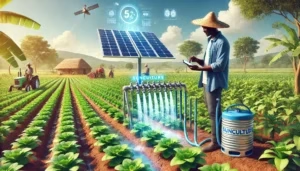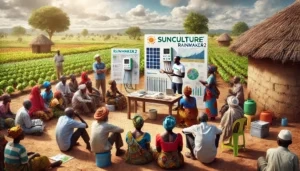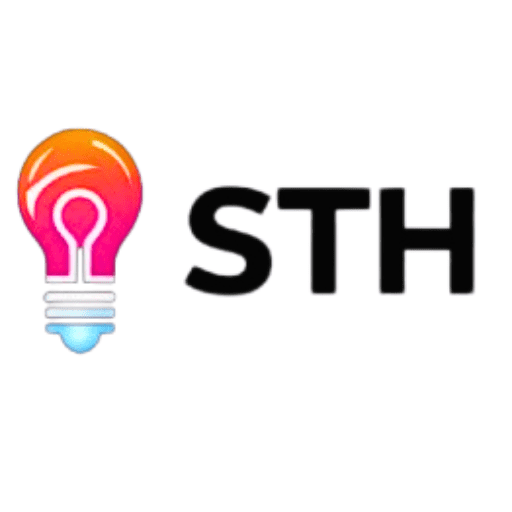Current climate change, food insecurity issues, and global possibilities have allowed new innovative startups to duplicate. A list of these pioneers includes SunCulture a Kenyan-based innovative company specializing in solar pumping technology with the ability to provide irrigation services to farmers. SunCulture has positioned itself to tackle major issues affecting global agriculture and improve living standards among the rural populace.

The Vision Behind SunCulture
SunCulture is an agritech firm that was started in 2012 by Samir Ibrahim and Charles Nichols to support smallholder farmers all over Africa. The company’s mission is simple yet profound: to bring agro-services, that is sustainable agriculture, within the reach of everyone and the profitability of the investments as long as the living conditions of the rural populations are concerned. As more than 80% of Africa’s farmland is still dependent on rain-fed farming, SunCulture’s products and services are a breakthrough.
It’s not about the money for them; they want to change agriculture for the better, towards being sustainable and profitable. With the availability and efficient use of renewable energy, SunCulture has shown the path to sustainable agriculture by employing advanced technologies.
About the Founders
SunCulture has a powerful team led by the company’s CEO Samir Ibrahim and CTO Charles Nichols who combine passion and experience in their work. The founder, Samir Sitati, is a fanatical social impact and sustainable development strategist – he studied business at the New York University Stern School of Business. Charles especially with the engineering background will help the company as he has been known to come up with good technologies. Both have resulted in the formation of a company that incorporates commercial strength with social purpose.
Among the facts that would be rather fascinating to understand is the fact that the founders met whilst engaged in a certain topical project that could be described as a work targeting the provision of educational opportunities for rural communities. Their passion for the development of meaningful solutions brought them to a point where they started to think about solutions to the problem of agriculture which resulted in the emergence of SunCulture. This has served as one of the major goals for the success of this company while at the same time supporting creativity.
Fresh and New products with farmers.
Its central product is the RainMaker2 – a solar irrigation system that has a high-flow pump and a tracking system. Farmers are thus able to extract water from several point sources such as wells; rivers and lakes; and convey the water to the crops in the most efficient manner.
SunCulture’s products go beyond irrigation, offering a suite of tools and services designed to holistically address the challenges faced by smallholder farmers:

Climate Monitoring Sensors: The cultivating instruments give real-time climatic and soil information to the farmers for controlling schedules of irrigation and rain for the periods of planting and harvesting. The sensors help to achieve optimum water control which in return helps to save a lot of water and increases crop yield.
Pay-As-You-Grow Financing: Realizing that many micro farmers have limited cash, SunCulture has adopted a low down payment policy that requires farmers to pay in installments for their equipment. This innovative way helps in depriving the cost for farmers, to bring Equinox GPS to those farmers who are in the lower end of the economic segment.
Agronomy Support Services: SunCulture is not only a supplier of the tools; they offer support as well. Their team of agronomy specialists provides farmers with crop recommendations, and soil and pest management information so that farmers can get optimal yields on their investments. This approach is friendly and welfare-oriented and ensures that the farmers trust the firm and the produce in the long run.
Renewable Energy Integration: Besides, irrigation, SunCulture incorporates renewable energy products in farm needs such as light, cold chain, and other needs for equipment. It does this not only by decreasing dependency on oil but also by generating energy-secure farming systems.
Mobile Connectivity and Digital Platforms: Using tactical technology that comes with the systems, farmers are also able to operate the machinery using mobile phones depending on the type of system that SunCulture is selling. This connectivity also enables efficient updates, fast and distant issue identification, and coordinated work as an organization for the farmers in rural areas.
Integrating these features into the system is a guarantee that via SunCulture, farmers are making a living and not just living a life. Such a broad strategy has provided the company with considerable benefits of enhancing production and organizational flexibility in some of the most difficult agricultural environments.
Waste Robinson Interesting Facts About SunCulture
Early Beginnings: SunCulture began with a mere ten employees and one experimental unit. Today, it is among the biggest companies in the agri-tech sector in Africa, housing talented workers who are committed to change.
Impact Metrics: The company has helped farmers cut water consumption to as much as 80 percent and improve their yields by more than 300 percent. The above figures show the extent to which their technology can bring about change, especially in areas where the agriculture industry has been limited by resources’ unavailability.
Renewable Energy Advocate: CO2 emissions have been greatly reduced through the replacement of diesel-run pumps with solar energy by SunCulture. These efforts to reduce carbon footprint are well in line with the world’s initiatives towards combating climate change making SunCulture a green company.
Recognition and Awards: SunCulture had the opportunity to present to the World Economic Forum and was shortlisted for the Zayed Sustainability Prize. These honors help to stress the international significance of their outcomes and creativity.
Community Engagement: Currently the company has regular walks where it takes its technology to the rural areas and this helps farmers to embrace and properly use the company’s technology. Thus, I argue that SunCulture is patiently creating long-term trust and user loyalty by cultivating users’ ownership and competence.
Gender Empowerment: SunCulture is highly sensitive to gender issues because women are some of the most important stakeholders in agriculture. Most of their activities are targeted at responding to an appropriate call by enhancing the ability of women farmers to fully embrace sustainable practices in farming to bring about improved incomes in their households.
Innovative Funding Models: SunCulture adapting a pay-as-you-grow business model has not only affordable their technology but also caused what it influenced equivalent strategies in other industries. Smallholder farmers have benefited from this unique approach to financing, as it helps to overcome many of the impediments that hinder the adoption of improved inputs.
Expanding Footprint: After beginning its operations in Kenya the company has grown and spread its operations to more than one country in Africa. Future geographic expansion strategies are being developed pointing to their desire to expand the reach across the entire continent.
Collaborative Partnerships: SunCulture has partnered with Shell Fund for Asia, USAID, and Kenya Climate Innovation Centre among others. These collaborations give the needed support and WWET to enhance competitiveness, enhance innovation, and grow their horizons.
Focus on Education: Education is more than product provision, and at SunCulture, education is the keynote. Training courses and seminars are developed to improve farmers’ knowledge of contemporary agriculture, and thus, proper and efficient usage of their products.
Adaptation to Climate Challenges: SunCulture solutions are especially tailored for areas that experience climate change. They are supporting communities to be stronger for future challenges because, through the various tools extended to farmers, they assist the latter in countering adverse conditions such as drastic changes in climate.
Inspiration for Startups: SunCulture has lately emerged as the role model of any startup company that can display the effectiveness of both profitability and social returns. It motivates other individuals embracing the business idea to work hard in identifying solutions to matters affecting the world.
Financial Insights: Indeed, what the following analyses will reveal is that turnover, and especially profitability, tends to be higher in companies with stock market status than in firms without such a status.
SunCulture has been on an upward growth trend and according to the latest financial reports, it has an annual turnover of more than $10 million. Although the company was not profitable at the end of the most recent financial year because of huge expenditures incurred on Research and Development and business expansion it is heading towards a profitable period.
SunCulture is a private company and it has not floated any of its stocks on any public trading platform hence no stock exchange market for SunCulture stock yet. But in the future, there have been speculations about the company going for a listing to enhance capital to fund its expansions. Currently, the company survives on private funds and grants from organizations with similar visions and objectives as that of the firm. Such robust financial support is evidence of investors’ confidence in SunCulture’s prospects of growth and revolutionalisation of agriculture in Africa.
Competitors in the Market
Currently, SunCulture works in a competitive environment with several other actors striving to offer solutions for sustainable agriculture. Key competitors include:
M-KOPA Solar: Having solar home systems and water pump products similar to those on which the company focuses.
KickStart International: Fields both manual and solar-powered irrigation pumps for African smallholder farmers.
Futurepump: Mainly emphasizes economical solar-powered water pumps with a special concentration on small farmers.
SolarNow: Develops and implements its complete solar solution for the improvement of irrigation in rural communities.
However, competition is stiff, SunCulture has made an outstanding difference by adopting modern technology, easy financing, and its more farmers support services. These are among the factors that make its model wholesome as it looks at the technological, economic, and educational aspects affecting the farmers.
Consequences to Rural Communities, Society, and the Global Society

Over the years, SunCulture has paved a success that has influenced the lives of thousands of households positively. Some of the benefits farmers using these systems have cited have included; increased productivity, reduced labor, and enhanced incomes. It’s worth noting that the company’s solutions also have an impact on the reduction of environmentally unsustainable consumption of diesel for pumps and on water wastage.
On a larger perspective, SunCulture is solving some of the world’s biggest problems such as hunger, poverty, and climate change. By enabling more efficient and sustainable farming practices, the company is helping to:
It diminishes variations in greenhouse gas releases.
The main goal of objective II is aimed among other things at combating water scarcity through proper irrigation practices.
Increase food security through improved production and the yields of crops.
They should provide support to rural economies by informing farmers.
SunCulture has an impact not just on farming. From enhancing availability and access to food they are changing the face of communities and creating a new economy. The company has also enhanced gender features by empowering women which by now form a core part of the employment in the agricultural sector. Farms run by women have raised their levels of productivity when they deployed solutions from SunCulture, making it a socially responsible firm as well.
Navigating Challenges
SunCulture is like any other startup organization and therefore it has had its fair share of challenges. Certainly, managing a company in rural contexts has some constraints such as; structural issues in terms of accessing markets transport networks, and sometimes low levels of literate users. However, some barriers stand out the company has been able to overcome mainly due to its focus on innovation and better customer design. They have also been able to concentrate on affordable financing models and local players.

At the same existence, the challenges have also been the reason that SunCulture has had the opportunity to grow. For instance, the decision to use a pay-as-you-grow financing model as well as other changes in the business strategy was a direct result of the company’s understanding that the upfront costs were significant for the smallholder farmers. Likewise, by incorporating mobile connectivity and real-time data into their products, the main motivation was to demystify the use of technology in the hands of rural users.
Looking Ahead: The Future of SunCulture
SunCulture story is not an episode of a tragic ending. It is also dynamic in its business and also diversifies and grows its product portfolio to meet new challenges. Plans include:
Scaling Operations: Particularly, the decision to increase its presence in such countries and regions, focusing on those that experience the same issues in the agrarian sector as African nations do.
Enhancing Technology: Increasing the usage of artificial intelligence and machine learning in the provision of more accurate estimates of the market situation to farmers to increase yields even further.
Diversifying Offerings: Creating new approaches for efficient fodder production, animal breeding, post-harvest technologies, and crop and grain logistics for the entire agricultural supply chain.
Strengthening Partnerships: Forming new partnerships with governments and NGOs as well as engaging with new private sector players to increase the impact and provide service to underprivileged populations.
Achieving Profitability: Ensuring a social impact, as well as their financial viability through the expansion of their customers and organization efficiency.
What SunCulture is doing is not just developing technology and improving access to it but also forming an environment that allows the people in rural areas to grow, thrive, adapt, and become prosperous. Through embracing flexibility in meeting farmers’ needs and the ever-rising impacts of climate change, SunCulture is poised to become the key vehicle of change in modern farming.
Conclusion
SunCulture has fully demonstrated that technology coupled with innovation can indeed solve some of the greatest challenges facing our world today. In this way, the company offers smallholder farmers sustainable, affordable, and innovative technologies for better agriculture that would transform the sector alongside improving the quality of life of people. These are not only effects in the fields – they are improving the future of our planet and its people in the concept of adequate food availability.
To the policymakers, investors, and other fellow entrepreneurs, SunCulture provides rich lessons for balancing financial gains and impact. As the company adjusts all the time, the idea of a better future waiting for agriculture still serves as motivation for everyone.












